A few of mariner’s recent posts have focused on that point in time when an individual must reinvent their identity, perhaps look for another income, and not lose their collaboration with their fellow humans. Those solutions ascribed to the social psychology of organizations and self sufficiency.
But it is easier than that. Mariner doesn’t get out very often, that is, to roam about in the rambunctious diversity of the public domain, but every once in a while he must visit the medical industry in a nearby small city.
Many folks are preoccupied with personal issues and aren’t prone to notice other public folks. Nevertheless, most citizens moving about in the public domain are willing to engage in ‘of the moment’ encounters.
While roaming about the halls and offices of the hospital, numerous interchanges occurred between mariner and others in the halls. When he first arrived, he met with a coordinator who checked credentials and scheduled his visit. She mentioned during the interview that she could smell the cookies baking in the souvenir shop; she lamented that she could not leave her post to buy some.
After that, while a guide led him to the right waiting room, she said that she recognized his face. That led to a short exchange of sharing geographical histories.
Visiting with the technician, mariner inquired about the kind of decisions that were promulgated because of his examination. The conversation led to a discussion about the complexity of decision making among many medical individuals.
While mariner was walking back to the front exit, two nurses at different moments asked if he needed a wheelchair or was lost. Finally, mariner met with his wife at the souvenir store where he bought cookies for the coordinator. When he delivered them, all the coordinators had a cheer that someone gave them a gift.
So collaboration is such an intrinsic human behavior that it almost ignites itself. Still, each individual must strike a match to engage. That’s all there is to it. Mariner realizes that certain personality types will find it hard to engage with random strangers and many suffer from depression and life stress. Nevertheless, engagement is always there – even if political differences may prohibit extended collaboration.
Mariner was well aware that he had roamed a public domain rich with fellow collaboration. Who needs an organization?
Ancient Mariner


 Zoom in: Pink decided to celebrate a milestone birthday — his 60th — by giving gifts to all the people who’ve shaped his life and matter to him.
Zoom in: Pink decided to celebrate a milestone birthday — his 60th — by giving gifts to all the people who’ve shaped his life and matter to him. Selecting a gift was the tough part, he writes. It had to have universal utility and appeal, and it had to be cheap enough to buy in bulk.
Selecting a gift was the tough part, he writes. It had to have universal utility and appeal, and it had to be cheap enough to buy in bulk. Nosey Mole lives in a large maze of tunnels. The food is good and there is little concern for catastrophe. Still, being nosy, he pops to the surface periodically to see what’s happenin’. Every time he pops up to look around, he gets whacked by the swirl of reality and returns to his tunnels. There is no great historical theme in Nosey’s life that must be feared or hoped. Life is pleasant in the tunnels.
Nosey Mole lives in a large maze of tunnels. The food is good and there is little concern for catastrophe. Still, being nosy, he pops to the surface periodically to see what’s happenin’. Every time he pops up to look around, he gets whacked by the swirl of reality and returns to his tunnels. There is no great historical theme in Nosey’s life that must be feared or hoped. Life is pleasant in the tunnels.


